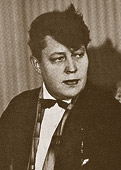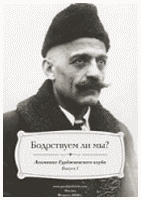Jane Heap

Jane Heap (1887–1964) was born in 1887 in Topeka, Kansas. After finishing school, she moved to Chicago, where she studied at the Art Institute of Chicago, after which she became an art teacher at the Lewis Institute. In 1912 Heap was one of the co-founders of Maurice Browne’s Chicago Little Theater, an avant-garde theater group, which staged plays by Chekhov, Ibsen and Strindberg, as well as other contemporary plays. In 1916 she met Margaret Anderson and became the co-editor of the literary journal, The Little Review, which was published first in Chicago and then, since 1917, in New York.
Her work in the magazine was very low-profile – she signed her texts as “jh” – and, thus she has been called “one of the most neglected contributors to the transmission of modernism between America and Europe during the early twentieth century.” Nonetheless, she was a creative and bold force of the magazine and, essentially, a significant figure in the promotion of modernism in literature. This magazine published numerous works by prominent American, English and Irish writers, including Ezra Pound, T.S. Eliot, Hart Crane, Ernest Hemingway, William Butler Yeats, Andre Breton, Jean Cocteau, Carl Sandburg, Gertrude Stein, Wallace Stevens and James Joyce, being the first to publish chapters of the latter’s novel, Ulysses in 1920, on a recommendation by Ezra Pound.
In 1921 Heap became the magazine’s main editor, after Anderson renounced her position, and was instrumental in introducing poets of the Surealists and Dadaists. Heap had first heard about Gurdjieff from Orage. She met Gurdjieff in 1924 during the latter’s visit to New York. She set up a Gurdjieff study group at her apartment in Greenwich Village. In 1925 she moved to Paris to become a pupil of Gurdjieff at his ‘Institute for Harmonious Development of Man’. Anderson had moved to Paris in 1924, and together they continued publishing the Little Review, before deciding to close it in 1929. Around that time Heap adopted Anderson’s two nephews, after Anderson’s sister had a nervous breakdown.
In 1927 Heap established her own group, devoted to studying Gurdjieff’s spiritual traditions, which was joined by Kathryn Hulme and Solita Solano, before developing into an all-women group called “The Rope,” which was instructed by Heap and by Gurdjieff himself. In 1935 Heap was instructed by Gurdjieff to go to London to establish a new study group, where she remained for the rest of her life. Her study group became very popular among many London devotees of the avant-garde, and included future theater producer Peter Brook. Heap published texts with her ideas only in the Little Review. A collection of her and Gurdjieff’s aphorisms, as well as some of her notes, reflecting her approach to Gurdjieff’s ideas, were published was published by her former students. She died in 1964 from diabetes.
The reference to the book:
Dear Tiny Heart The Letters of Jane Heap and Florence Reynolds
Quotations:
- Never oppose someone with the same center, always offer another one.
- Do not sit too long in the same place.
- You are responsible for what you have understood.
- Little steps for little feet.
- Suppress natural reaction and pay for it later.
- We never refuse in the Work.
- Animals are nature’s experiments and embody all the emotions.
- A cat is all essence. Essence remembers.
- All that falls from the wagon is lost.
***
Wish is organic. Wish is a movement toward something.
***
To make a relationship with someone is to make a relationship with yourself.
***
The essence is in the emotions, but not of them. The “I” is in the essence,
but not of it.
***
What we usually think of as a relationship is actually an attachment.
***
Love your enemies – they may tell you the truth.
***
Ordinary happiness is nothing but release from tensions.
***
The body is an animal – innocent – and can never be blamed.
***
Growth of understanding becomes hunger for Being.






